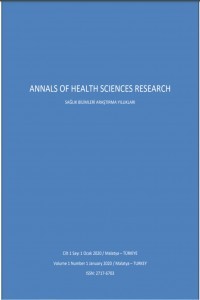İnönü Üniversitesi Tıp Fakültesi Öğrencilerinin Tıpta Uzmanlık Tercihleri ve Etkileyen Faktörler
İnönü Üniversitesi, tıp eğitimi, TUS, GSA
Residency Choices of Medical Students at Inonu University Medical Faculty and the Factors to Affect These Choices
___
- 1. World Conference on Medical Education. The Edinburg Decleration. Edinburg, 1998.
- 2. Tunç T, Özen KR. Role conflict, role ambiguity, and burnout in nurses and physicians at a university hospital in Turkey. Nursing and Health Sciences 2009; 11: 410-16.
- 3. Yoney H, Yavuz DG. Tıpta Uzmanlık Seçimi. Marmara Üniversitesi Yayınları 2010; 10-7
- 4. Saigal P, Takemura Y, Nishiue T, Fetters MD. Factors considered by medical students when formulating their specialty preferences in Japan: findings from a qualitative study. BMC Med Educ 2007; 11: 7-31.
- 5. Kılıç C. Genel Sağlık Anketi: Geçerlik ve güvenirlik çalışması. Türk Psikiyatri Dergisi 1996; 7: 3-11.
- 6. Goldberg DP. Manual of the General Health Questionnaire. Slough: NFER-Nelson 1978.
- 7. Kılıç C, Rezaki M, Rezaki B, et. al. General Health Questionnaire: Psychometric properties and factor structure of the scales in a Turkish primary care sample. Soc Psychiatr Epidemiol 1997; 32: 327-31.
- 8. Yıldız AN, Kurt M, Öklem MŞ, Özcan S, Nurdan Ö, Temel F. Hacettepe Üniversitesi Dönem VI Öğrencilerinin Tıpta Uzmanlık Sınavı (Tus) Hakkındaki Görüşleri. Hacettepe Tip Dergisi 2008; 39: 60-7.
- 9. Kutanis RÖ, Tunç T, Tunç M. Tıpta Uzmanlık Eğiticileri Ve Uzmanlık Öğrencileri Tıpta Uzmanlık Sınavını (Tus) Nasıl Algılıyor? Kuram ve Uygulamada Eğitim Bilimleri 2011; 11: 1991- 2004.
- 10. Dikici MF, Yaris F, Topsever P, et al. Factors Affecting Choice of Specialty Among First-year Medical Students of Four Universities in Different Regions of Turkey. Croat Med J. 2008; 49: 415-20.
- 11. Khader Y, Al-Zoubi D, Amarin Z, et al. Factors affecting medical students in formulating their specialty preferences in Jordan. BMC Medical Education 2008; 8-32.
- 12. Dorsey ER, Jarjoura D, Rutecki GW: The influence of controllable lifestyle and sex on the specialty choices of graduating U.S. medical students, 1996–2003.Acad Med 2005; 80: 791-6.
- 13. McCord JH, McDonald R, Leverson G, Mahvi DM, Rikkers LF, Chen HC, Weber SM: Motivation to pursue surgical subspecialty training: is there a gender difference? J Am Coll Surg 2007; 205: 698-703.
- 14. Buddeberg-Fischer B, Klaghofer R, Stamm M, Marty F, Dreiding P, Zoller M, et al. Primary care in Switzerland – no longer attractive for young physicians? Swiss Med Wkly. 2006; 136: 416–24.
- 15. Baboolal NS, Hutchinson GA. Factors affecting future choice of specialty among first-year medical students of the University of the West Indies, Trinidad. Medical Education 2007; 41: 50-6.
- 16. Huda N, Yousuf S. Career preference of final year medical students of Ziauddin Medical University. Educ Health (Abingdon) 2006; 19: 345–53.
- 17. Chang PY, Hung CY, Wang KI, Huang YH, Chang KJ. Factors influencing medical students’ choice of specialty. J Formos Med Assoc. 2006; 105: 489-96.
- Başlangıç: 2012
- Yayıncı: İnönü Üniversitesi
Üç Köklü Maksiller Birinci Premoların Endodontik Tedavisi: Bir Olgu Sunumu
Mevlüt Sinan OCAK, Fuat AHMETOĞLU
Atan Kalpte Bypass Deneyimlerimiz
Hasan UNCU, Mehmet ACIPAYAM, Tolga Onur BADAK, Habib ÇAKIR, Gür Deniz YILDIZ, Pınar DOĞAN, İbrahim ÖZSÖYLER
Travma Geçirmiş Hastada Tüm Ağız Tedavisi: Olgu Sunumu
Nilüfer Tülin POLAT, Mustafa Hayati ATALA, Fuat AHMETOĞLU, Serkan POLAT
Böbrek Alt Kaliks İnfundibulum Çapının ESWL Başarısına Etkisi
Evren KÖSE, Fatih OĞUZ, Ali BEYTUR
Osman Tolga HARORL, Çağatay BARUTCİGİL
Adipoz Dokudan Salgılanan Bir Hormon: Apelin
Malatya Bölgesinde Dişeti Çekilmesinin Yaygınlığının, Şiddetinin ve Etkenlerinin Araştırılması
Abubekir ELTAŞ, Vesile Elif TOY
Miyotonik Distrofili Hastada Anestezi Yönetimi
Mustafa Said AYDOĞAN, Mehmet Ali ERDOĞAN, Ülkü ÖZGÜL, Murat BIÇAKCIOĞLU, Yusuf Ziya ÇOLAK, Mahmut DURMUŞ
